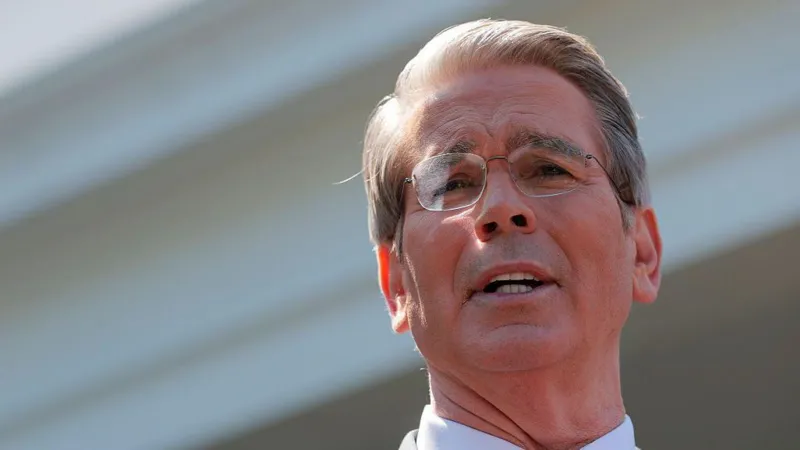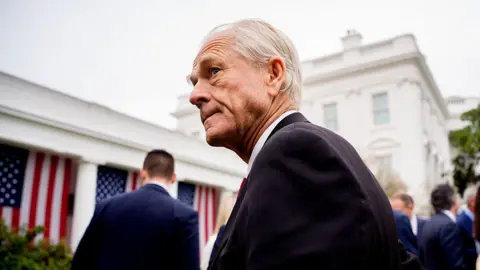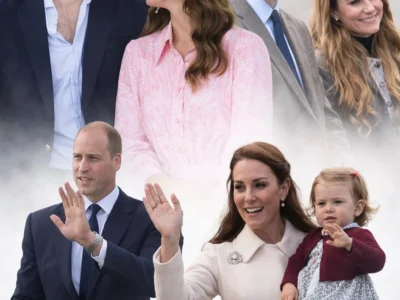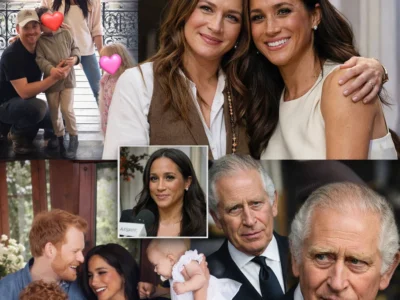
Treasury Secretary Scott Bessent addressed reporters within minutes of Trump’s tariffs pause on 9 April
In the chaotic minutes after US President Donald Trump’s administration abruptly reversed course and paused dozens of sweeping “reciprocal” tariffs, one man quickly became the public face of the decision: Treasury Secretary Scott Bessent.
“It took great courage,” the bespectacled 62-year-old former hedge fund manager told the dozens of reporters gathered around him on 9 April. “Great courage to stay the course until this moment.”
Notably absent during the press briefing – after which markets rocketed – were the other two men tasked with delivering Trump’s tariff message to the American people: Commerce Secretary Howard Lutnick and trade adviser Pete Navarro.
Bessent’s centre-stage role in the tariffs announcement, some trade policy veterans have suggested, starkly highlights how shifting power dynamics within the White House brought the US back from the brink of an all-out global trade war, even if all the players are broadly supportive of Trump’s economic agenda.
“He’s playing the good cop,” William Alan Reinsch, the former head of the National Foreign Trade Council, told the BBC. “And Lutnick and Navarro are playing the bad cop.”
Publicly, the White House has been largely quiet on the chain of events that led to Trump’s market-shaking decision to pause reciprocal tariffs for most countries while raising levies on China, with the president saying only that he had been “thinking about it” for a “few days” before it “came together” early on the morning of 9 April.
But according to US media reports, it was Bessent, inundated with calls from business leaders, that played a key part in swaying Trump, including with conversations on Air Force One the weekend beforehand and in the Oval Office on the morning of the decision.
Earlier in his career, Bessent expressed reservations about tariffs. Some observers believe these views, together with long experience in the bond market, ultimately made it possible for him to gain the president’s ear over Navarro and Lutnick, both of whom represented a harder-line stance on the tariffs.
“I think what happened was that Trump wasn’t paying attention to the bond market,” added Mr Reinsch, now an economics expert at the Center for Strategic and International Studies. “And Bessent got him to pay attention.”
Mr Reinsch, who was also undersecretary of commerce for export administration in the 1990s during President Bill Clinton’s administration, said that Bessent’s approach, so far, has been “a classic way to deal with Trump”.
“Don’t tell him he’s wrong or made a mistake,” he added. “Tell him there’s a better way forward to achieve his objectives, and that the market is not reacting the way we want it to react.”

Navarro, considered a Trump loyalist, served four months in jail for contempt of Congress after ignoring a subpoena from a committee investigating the Capitol riot
On the morning of the announcement on 9 April, Trump met in the Oval Office with Bessent as well as National Economic Council director Kevin Hassett and Lutnick, the 63-year-old former chief executive of Cantor Fitzgerald and a noted China hawk.
Two other key players in tariffs policy were notably absent, prompting one source close to the White House to tell Reuters news agency there had been a “pecking order change”.
One, US Trade Representative Jamieson Greer, was just a short drive away on Capitol Hill, testifying about tariffs before a House of Representative committee.
He would later that day learn of the tariffs announcement in real-time along with the lawmakers, prompting a tense exchange in which he was accused of having the “rug pulled out” from underneath him.
The other, Peter Navarro, was similarly absent despite being one of the most visible figures in the media on tariffs, prompting speculation his stance had fallen out of favour with the president.
At times, the various figures involved in tariffs gave contradictory statements on the policy, which experts say contributed to confusion and market volatility.
“They are not singing on the same page,” said Mark Sobel, who spent nearly 40 years at the Treasury Department, including as deputy assistant secretary for international monetary and financial policy.
“You hear Navarro, you hear Bessent, you hear the president and you feel you’re getting whiplash,” he added. “This is not a disciplined group.”
Terry Haines, the founder of Washington DC-based consultancy Pangaea Policy, told the BBC he believes that it was “deliberate” that the administration put forward various people to become the public faces of tariffs.
“[They wanted to] throw as many spokespeople out there, say different things, and flood the zone with opinion,” he said. “It may have efficacy in politics, but it confuses the hell out of markets.”
As an example, Mr Haines pointed to Navarro, who he said gets “more leeway than you’d expect” owing to the four-month jail term he served for contempt of Congress after ignoring a subpoena from a House committee investigating the 2021 US Capitol riot.
“They appeal to different audiences. Bessent would be interested in the financial press, while Navarro has a different message,” he said.
Haines, however, cautioned against assuming that any one person contributed the most to Trump’s decision.
“Markets want winners and losers, like People magazine-style stuff,” he said. “But we need to know who to listen to, and that became, pretty much by default, Bessent.”
Several experts contacted by the BBC said they expect Bessent to now take a much more prominent public role in tariff policy, with Lutnick taking charge of the negotiations, while Navarro, Hassett and Greer play supporting roles.
Haines, for example, said he believes Bessent will become, in real terms, “the spokesman for economic policy”.
Ultimately, a more structured approach could contribute to market stability, according to Andrew Hale, an economist at the conservative Heritage Foundation.
“I imagine it will get more certain as we go forward,” he said. “It’s what businesses and investors want.”


